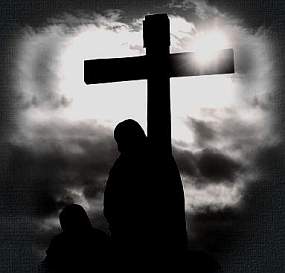Friday, January 19, 2007
One of Life's Riddles...
 To come to the pleasure you have not
To come to the pleasure you have notYou must go by a way in which you enjoy not.
To come to the knowledge in which you have not
You must go by a way in which you know not.
To come to the possession you have not
You must go by a way which you possess not.
To come to what you are not
You must go by a way in which you are not.
Quite deep. I was slightly puzzled over the above "riddle".
What way? How? Definitely worth a ponder yourselves before proceeding.
It made me reflect and search. Here's what I found...
- To come to the pleasure you have not
You must go by a way in which you enjoy not.
- "Enter by the narrow gate; for wide is the gate and broad is the way that leads to destruction, and there are many who go in by it. Because narrow is the gate and difficult is the way which leads to life, and there are few who find it." (Matt 7:13-14)
To come to the knowledge in which you have not
You must go by a way in which you know not.
- "Come to Me, all you who labor and are heavy laden, and I will give you rest. Take My yoke upon you and learn from Me, for I am gentle and lowly in heart, and you will find rest for your souls. For My yoke is easy and My burden is light." (Matt 11:28-30)
To come to the possession you have not
You must go by a way which you possess not.
- "He who loves father or mother more than Me is not worthy of Me. And he who loves son or daughter more than Me is not worthy of Me. And he who does not take his cross and follow after Me is not worthy of Me. He who finds his life will lose it, and he who loses his life for My sake will find it." (Matt 10:37-39)
"If anyone desires to come after Me, let him deny himself, and take up his cross daily, and follow Me. For whoever desires to save his life will lose it, but whoever loses his life for My sake will save it. For what profit is it to a man if he gains the whole world, and is himself destroyed or lost?" (Luke 9:23-25)
To come to what you are not
You must go by a way in which you are not.
- "Lord, we do not know where You are going, and how can we know the way?" Jesus said to him, "I am the way, the truth, and the life. No one comes to the Father except through Me." (John 14:5-6)
**************************************
Now I understand. Hope you got it too.
"HE must increase, but I must decrease." (John 3:30)
Note: The above poem is taken from "Ascent of Mount Carmel" by St John of the Cross
Labels: Discipleship, Inspirations / Poem, Spiritual Direction / Guidance, Spiritual Growth
Continue to read "One of Life's Riddles......."Friday, December 08, 2006
Turning the Other Cheek

Imagine these scenarios:
- A person criticizes you, or ridicules your faith in a sarcastic manner – how do you respond?
- Someone has hurt you in the past. But an opportunity presents itself to help them. Do you freely oblige, or do you think, “I can’t be bothered, why should I help a person that has hurt me?”
- Imagine your employer legislating that Christians can no longer wear crosses, or be able to speak about your faith in the workplace. What should be the biblical response?
- How does one respond to a situation like with what is happening with the Christian Unions in Britain?
 Note that this verse is not saying that we should not prevent injustice or defend against what’s done towards us, but when the offence is already committed, the response, and the manner of response becomes important and that is what Christ is saying here. There is a difference between a posture of defense, versus to actualy mount a retaliation against the person who is attacking you – and here, it’s the striking back bit that Jesus is putting a finger on… For most of us, we do not take revenge by physically hurting someone or killing them. By we do so usually in more subtle ways – the cold shoulder, a word here and there against another person’s character, or even not helping when you are in a position to.
Note that this verse is not saying that we should not prevent injustice or defend against what’s done towards us, but when the offence is already committed, the response, and the manner of response becomes important and that is what Christ is saying here. There is a difference between a posture of defense, versus to actualy mount a retaliation against the person who is attacking you – and here, it’s the striking back bit that Jesus is putting a finger on… For most of us, we do not take revenge by physically hurting someone or killing them. By we do so usually in more subtle ways – the cold shoulder, a word here and there against another person’s character, or even not helping when you are in a position to.- “If someone strikes you on the right cheek, turn to him the other also. And if someone wants to sue you and take your tunic, let him have your cloak as well. If someone forces you to go one mile, go with him two miles.”
I used to read these verses and not realize how thought-through the examples were. I assumed that they were somewhat arbitrary, but as I prepared for this sermon, I could see that these examples covered different categories of mistreatment. The slap on the face points to physical violence or insults to our personhood or character. Someone suing and taking your tunic cover situations where there are wrongful attacks on our possessions. The third one – someone forcing you to go one mile – relates to the curtailment of personal liberties, or coercion to do something you may not want to do. With these examples, Jesus leaves us very little by which to justify exceptions for disobeying His call to “not resist”.
So where does that leave us? Is Jesus really asking us to be passive?
Some bible commentators imply that Jesus is calling us to be pacifist stance towards mistreatments done to us. But I would suggest to you that Jesus is asking us to take action, rather than being passive. Listen to what Jesus is saying here: Turn your right cheek, give your coat, and go the second mile.
Christ is, in effect, calling us to respond, and in one sense, retaliate. But we retaliate not to return the offence, but with goodness and grace. There is nothing passive here. Sometimes, we approach these passages in the Sermon on the Mount as something to be adhered to, or even look at it as impossible standards that we should be attaining but actually can’t or don’t. We grit our teeth, and feel we need to endure the scourge on our backs. I know that I do.
However, by looking at it this way, we miss the point completely, and this robs the gospel of its full power. I started off preparing for this passage thinking that this was a verse about not taking revenge. But as I opened up the passage more, I discover that at its core, is the gospel story.

I would encourage you to now consider broken relationships in your own lives where there has been mistreatment, perhaps injustice – where there is not only unforgiveness, but also a desire to want to punish the persons involved for something they have done (or not done). I want to challenge you to bring it under the light of this part of God’s word. In the passage, Christ is not merely saying, “don’t take revenge”. He is saying to us: “Don’t withhold good from those who have offended or hurt us.”
This is not merely something we perform externally - this is who we are in faith, and what we have to become in Christ. May we take heed, and stand firm in the wisdom that God gives us in His word in this matter if we are to walk in the way of our Saviour.
 “Your attitude should be the same that Christ Jesus had. Though he was God, he did not demand and cling to his rights as God. He made himself nothing; he took the humble position of a slave and appeared in human form. And in human form he obediently humbled himself even further by dying a criminal's death on a cross.” (Philippians 2:5-8, NLT)
“Your attitude should be the same that Christ Jesus had. Though he was God, he did not demand and cling to his rights as God. He made himself nothing; he took the humble position of a slave and appeared in human form. And in human form he obediently humbled himself even further by dying a criminal's death on a cross.” (Philippians 2:5-8, NLT)-- (Condensed from a talk given at Westminster Chapel, London)
Related Posts:
Labels: Christian Living, Discipleship, Evil, Forgiveness
Continue to read "Turning the Other Cheek...."Sunday, October 29, 2006
Cost of Following Christ
 God has been challenging me towards what I would term as "higher allegiances" over the past weeks. In the last few days, He has been more directed in terms of drawing me towards specific verses in His word.
God has been challenging me towards what I would term as "higher allegiances" over the past weeks. In the last few days, He has been more directed in terms of drawing me towards specific verses in His word.After breakfast Jesus said to Simon Peter, "Simon son of John, do you love me more than these?" "Yes, Lord," Peter replied, "you know I love you." "Then feed my lambs," Jesus told him. Jesus repeated the question: "Simon son of John, do you love me?" "Yes, Lord," Peter said, "you know I love you." "Then take care of my sheep," Jesus said. Once more he asked him, "Simon son of John, do you love me?" Peter was grieved that Jesus asked the question a third time. He said, "Lord, you know everything. You know I love you." Jesus said, "Then feed my sheep. (John 21:15-17, NLT).
In the above account, Jesus was asking Peter a few times.... Do you love Me? The response from Peter was, in effect, "Yes Lord, you know I like you" -- hesitant and tentative. By the time Jesus asked the third time, Peter was hurt. I always wondered why - was he hurt because he felt Jesus didn't believe him? Was Peter hurt because he felt that Jesus was condemning him for denying Him? Did Peter feel like Jesus was rubbing salt in the wound? Perhaps...
But I read the passage with new eyes today. What I realised was that Peter was hurt because he knew he could not trust himself. Jesus was asking Peter three times to bring him back to his failures, not with a slap of condemnation, but to encourage him to count the cost of following the Master. Christ was in effect also saying, "Are you sure? Are you sure? Are you sure?"
"Count the cost, Peter. You denied me the last time you said you wouldn't. Did you think it was going to be easy?"
By then Peter was no longer the same person who was rash in saying yes without counting the cost. The sovereign Lord saw his heart. He was no longer speaking without any knowledge of what he was getting into. The brash, impulsive "I will follow you Lord anywhere" Peter has been broken. Disappointment. Anguish. Hurt. Scarred. In many ways, because his close association with Christ.
Do we know what its like to be broken inside by the Lord? The brokenness gives us a perspective not shaped by youthful impulsiveness, humanistic enthusiasm and foolish arrogance, but by a wiser, more sober disposition. Do we think our journeys with Christ is going to be easy? Christ will ask of all of us - I know He is challenging me - "When you say you love Me, what does it mean?"
- "If anyone comes to Me and does not hate his father and mother, wife and children, brothers and sisters, yes, and his own life also, he cannot be My disciple. And whoever does not bear his cross and come after Me cannot be My disciple. For which of you, intending to build a tower, does not sit down first and count the cost, whether he has enough to finish it-- lest, after he has laid the foundation, and is not able to finish, all who see it begin to mock him, saying, 'This man began to build and was not able to finish.' Or what king, going to make war against another king, does not sit down first and consider whether he is able with ten thousand to meet him who comes against him with twenty thousand? Or else, while the other is still a great way off, he sends a delegation and asks conditions of peace. So likewise, whoever of you does not forsake all that he has cannot be My disciple."
When you get a raw deal, one after another, after another. Just like Joseph.
When every one and every circumstance seems to be against you. Just like Elijah.
When the Lord requires that you sacrifice the things (or even that one thing) that you most cherish. Just like Abraham.
 I was challenged: Do I love Christ, or do I merely follow the "hassle-free" notion of Christ in my head? Can I follow the Jesus that entails being a participant in His sufferings, one that involves a price to pay? If you have not honestly answered that question - sooner or later, He will ask you, if you are serious in following Him further as a disciple. Just as He has asked Peter. Just as He is asking me again now.
I was challenged: Do I love Christ, or do I merely follow the "hassle-free" notion of Christ in my head? Can I follow the Jesus that entails being a participant in His sufferings, one that involves a price to pay? If you have not honestly answered that question - sooner or later, He will ask you, if you are serious in following Him further as a disciple. Just as He has asked Peter. Just as He is asking me again now.This question -- and our response -- will be painful. Painful because it will shine light on the reality of our relationship with Him. How deep are the roots? How much are we truly following? Whom are we really following, Jesus or the notion of Jesus? Is it contingent on people and circumstances? Does it transcend things most precious to us?
Ultimately, Jesus requires of us to bury things precious to us to follow Him when the occasions call for it: To step out of our zones of comfort. Getting past fears. Getting past self-pity. Getting past the need for self-vindication. But not just to get past, but also to follow, and enter into His kingdom's purposes. Jesus says it many times when he puts out calls for disciples.
- Now it happened as they journeyed on the road, that someone said to Him, "Lord, I will follow You wherever You go." And Jesus said to him, "Foxes have holes and birds of the air have nests, but the Son of Man has nowhere to lay His head." Then He said to another, "Follow Me." But he said, "Lord, let me first go and bury my father." Jesus said to him, "Let the dead bury their own dead, but you go and preach the kingdom of God." And another also said, "Lord, I will follow You, but let me first go and bid them farewell who are at my house." But Jesus said to him, "No one, having put his hand to the plow, and looking back, is fit for the kingdom of God." (Luke 9: 57-62, NKJV)
"I tell you the truth, when you were younger you dressed yourself and went where you wanted; but when you are old you will stretch out your hands, and someone else will dress you and lead you where you do not want to go." (John 21:18-19, NLT)
Labels: Church Life, Discipleship, Hardship / Struggles / Pain
Continue to read "Cost of Following Christ...."Subscription service
Enter your email address below to subscribe to Reflections on Life and Spirituality blog!(NOTE: Please be assured that this will not be used for spam or unsolicited communications)

